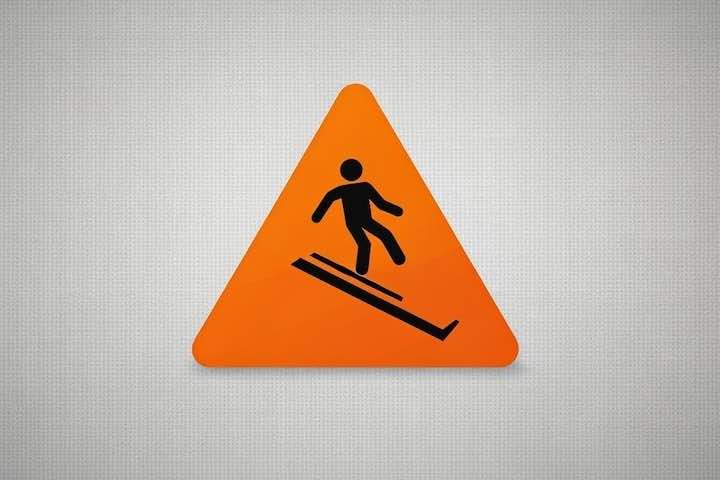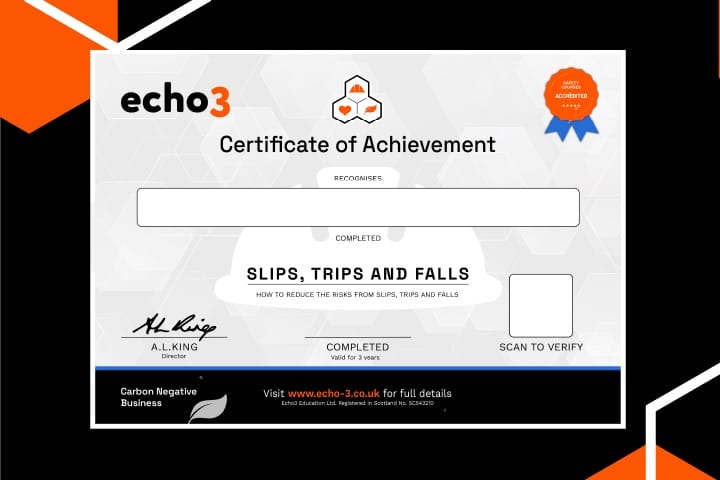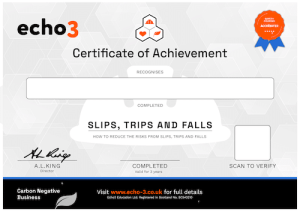Course Preview
Echo3 courses include engaging motion-graphic video content, with full english subtitles
WHO SHOULD TAKE THIS COURSE?
Anyone at risk of slips, trips, or falls in the workplace would benefit from this course. For example:
- Construction Workers
- Warehouse Workers
- Delivery staff
- Anyone frequently lifting at work
LEARNING OUTCOMES
On completion of this Slips and trips online training course learner will know;
- Understand legislation relating to slips and trips
- Know the most common injuries
- Understand the role of risk assessments
- What causes slips and trips
- How to prevent slips and trip
COURSE CONTENT
UNIT 1 | INTRODUCTION
In this short, two-section course, we first outline supporting information such as statistics, common causes of injury and legislation. Next, we detail the practical steps that can be taken to reduce risks.
Topic titles include:
- Definitions
- Facts and figures
- Legislation
- Common causes of accidents
UNIT 2 | PREVENTING SLIPS & TRIPS
In any workplace, taking responsibility for the safety of yourself and others is a key part of your role. In this section, let’s take a look at some of the duties you and your employer are expected to implement with regard to workplace safety.
- Good Housekeeping
- What employees can do
- Risk Assessments
- What employers can do
- Level Changes
- Signs
UNIT 3 | QUIZ
SLIPS & TRIPS CERTIFICATE
At the end of the Slips Trips and Falls training online there is a 15 question, multiple-choice quiz. If learners demonstrate their understanding of course content by achieving a minimum score of 80%, we’ll email them their completion certificate.
If learners score less than 80%, they can revisit any part of the course and retake the quiz until they are successful. A posted certificate is available for £9.
The certificate is valid for 3 years.
PLATFORM INCLUDES
- Memorable, motion-graphic training
- Fully accredited training
- Assignment support and reporting dashboard
- CPD accredited, verifiable certificate on completion
- Learn anywhere with an internet connection
- Licenses never expire
- Carbon neutral training solution
SLIPS & TRIPS LEGISLATION
The Health and Safety at Work Act 1974 requires employers to ensure the health and safety of all employees and anyone affected by their work, so far as is reasonably practicable, which means balancing the level of risk against the measures needed to control the risk in terms of money, time or trouble. This includes taking steps to control slip and trip risks.
The Management of Health & Safety at Work Regulations 1999 build on the HSWA to include a duty on employers to assess risks (including slip and trip risks) and take action where necessary.
WHEN DO SLIPS USUALLY OCCUR?
Most slips occur when the floor in contaminated. Trips occur when you catch your foot on an unexpected obstacle.
Most accidents result from;
- Uneven surfaces
- Low friction between footwear and floor
- Stairs
- Trailing cables
- Unsuitable flooring
- Poor housekeeping, for example not cleaning as you go
HOW TO REDUCE THE CHANCE OF SLIPS & TRIPS
Firstly undertake a Risk Assessment, this is mandatory and will help you see any issues to fix.
Depending on your findings, likely control measures will include:
- Ask staff to clean as they go, tidy cables, and keep walkways clear
- Ask staff to take care and stairs and hold the handrail
- Salt icy walkways and carparks in the winter
- Use matting where appropriate
- Provide appropriate slips trips and falls training for staff
- Ask staff to clean spillages immediately. And recognise ‘Caution Slippery’ signage is a short-term resort
- Select the right footwear for high friction
- Engineer improvements if budgets permit. For example, better lighting, improved flooring, level uneven surfaces.
INJURY STATISTICS FROM SLIPS
Statistics help us understand the risk so proportionate resources can be deployed.
From UK RIDDOR and HSE statistics we know.
- 69,206 non-fatal injuries were reported
- 20,022 of these non-fatal injuries resulted from Slips, Trips or Falls on same level.
- Around 1,000 major injuries happened on workplace stairs
- Cost to the NHS of workplace slips and trips is estimate at £133 million per year
- The cost to employers is over £500 million a year
- The biggest barrier to reducing accidents is not taking the risks seriously
CONTACT
If you have any questions about this Slips and Trips online training course, please email info@lucyketcham.com









